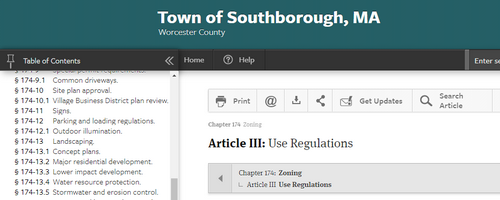Above: Town Meeting voters will be asked to amend Southborough’s “unusual” Town Code for appeals to the Planning Board’s Site Plan Review actions. (image cropped from code website)
At Annual Town Meeting, voters will be asked to approve a change to the zoning code. By stripping away one sentence, the Site Plan Approval appeal process would bypass the Zoning Board of Appeals and head straight to the courts.
Before you jump to conclusions – this isn’t an action taken by the Planning Board against the ZBA.
The Article was proposed by the Board of Selectmen. According to the Planning Board Chair, it stems from a comment made by a judge to Town Counsel. And Chair Don Morris said he is hopeful that the ZBA will support the change.
A public hearing on the issue will be held by the Planning Board on March 12th at 7:00 pm.
In the Planning Board’s Monday meeting, Morris recapped a conversation he had with Counsel Aldo Cipriano. He surmised that a judge told Cipriano it was unusual for a Town to give appeal authority to a board with less expertise on the issue than the original decision makers.
The Article in question asks voters to remedy that by removing the following language from Southborough Code section 174-10(G):
any person aggrieved by the action of the Planning Board on a site plan approval application may appeal said action to the Zoning Board of Appeals as provided in Article VI hereof,
In lieu of the ZBA, the Land Court would be the appeal authority. Town Planner Karina Quinn said she was told that Mass General Law outlines the standard appeal process.* Therefore, no replacement language is needed.
Although the article comes from selectmen, the public hearing on it is Planning’s responsibility. The board has asked Town Counsel to attend the meeting to answer questions from the public. Planning members already began raising their own questions on Monday night.
Members were all in agreement that Planning has the higher expertise required for Site Plan Review. They appeared to be in agreement that the ZBA isn’t the right body to rule on their decisions. But one member was hesitant about the impact on residents.
Member Phil Jenks said he didn’t like taking away the only appeal option for abutters that doesn’t require retaining a lawyer.
Member Jessie Stein countered that residents have the right to be heard during Planning Board’s Site Plan Review process. Jenks rebutted that sometimes residents have new objections after they had time to think.
Member Andrew Mills said he heard Jenks’ concerns. But he believed the length of time Planning spends on the review is sufficient for residents to be heard. If residents want to readress the decision after that, he believes they would understand that going to court is necessary.
Jenks didn’t fully agree and still wanted to discuss the issue with Cipriano.
The board also had technical questions about the Warrant Article and Town Code. One raised by Member Meme Luttrell was whether changes were also needed to the Town Code’s definition of the ZBA’s authority. She pointed out that Site Plan appeal is specified as part of its purview under 174-25A(1).
Quinn will be emailing Cipriano the board’s questions so he can address them at the hearing.
During the discussion, a reference was made to the “strange process” for a recent appeal under Town Code. Jenks lamented that when a developer appealed to the ZBA, the Planning Board wasn’t “a party”. That appeared to be a reference to the controversial Park Central project.
In 2016, the Planning Board publicly chafed at Site Plan Review restrictions under the ZBA’s special permits for Park Central developments. As they went through the process, developer Bill Depietri refused to grant an extension to allow the Board to go through more details of the Site Plan. Responding to what he characterized as obstruction by the board, Depietri walked out of the hearing.
Planning had to rule on the Site Plan otherwise (under the deadline) it would be considered “constructively approved”. Based on the lack of sufficient information, the board rejected the plan. That entitled Depietri to appeal back (somewhat successfully) to the ZBA.
When the developer appeared before the ZBA with his appeals, Planning wasn’t given a seat at a table. Instead, Morris was forced to make his comments from the podium, the same as residents. There was no counsel specifically representing the Planning Board’s interests. Instead, Town Counsel attended in an advisory capacity to the ZBA. (Though, Cipriano would probably clarify that he was representing the Town’s interests, not specifically the ZBA’s.)
*MGL Chapter 40A zoning, section 17 (Judicial review) outlines the standard appeals process:
Any person aggrieved by a decision of the board of appeals or any special permit granting authority or by the failure of the board of appeals to take final action concerning any appeal, application or petition within the required time or by the failure of any special permit granting authority to take final action concerning any application for a special permit within the required time, whether or not previously a party to the proceeding, or any municipal officer or board may appeal to the land court department, the superior court department in which the land concerned is situated. . . may appeal to the land court department, the superior court department in which the land concerned is situated. . .


